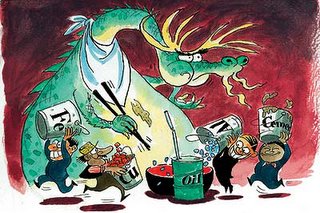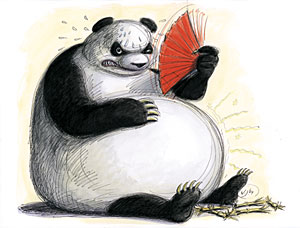 The way some talk about America's trade and finance relationship with the eastern dragon, you'd think the capitalist king was jealous of a quasi-communist developing country. China has more and cheaper labor. Unassailed by unions, they can offer investors factories free of labor standards and minimum wage. Untethered by a fully free invisible hand, the PRC can sustain an irrationally low valuation of its currency for exporters.
The way some talk about America's trade and finance relationship with the eastern dragon, you'd think the capitalist king was jealous of a quasi-communist developing country. China has more and cheaper labor. Unassailed by unions, they can offer investors factories free of labor standards and minimum wage. Untethered by a fully free invisible hand, the PRC can sustain an irrationally low valuation of its currency for exporters.
Today, Thomas Palley at TomPaine blows that wish away. He argues "China must change" and that it aint gonna be pretty.
I've lately been reading about the burgeoning US deficit and the possibility of a rough landing for Americans and less developed countries, notwithstanding the dollar's seeming defiance of economic gravity of late. But the way Palley puts it, though China's economy is growing rapidly it rests on a "pin made in America"--it's essentially running on borrowed time just as a the US is. In relying on the US consumers to supply over thirty percent of its export demand, the PRC may in fact be more vulnerable to US dollar devaluation---which will come, eventually.
I buy Palley's argument in so far as the PRC is dependent now in US successful financial mismanagement and indiscreet spending, however their production can easily be diversified: other countries can provide new big markets. In the short term, the US growth is essential to sustaining China's rapid export-orientated development. But as Palley points out, that's temporary. The Chinese market is likely to feel the heat of an unsteady US dollar coming and respond faster (ironically) than US policy makers and its cumbersome bureaucracies.
Meanwhile,  the US has endemic debt problem, tightly wound with its faltering social services, Defense Budget proliferation, and now promises to Katrina victims and their beleaguered state. And, as I argued in my last post, the unilateral response of the Federal Chairman is a less desirable answer than addressing the more difficult underlying budgetary ills. But that latter takes time; time during which China could easily use to diversify its portfolio of buyers and hash-out products for more low-end markets.
the US has endemic debt problem, tightly wound with its faltering social services, Defense Budget proliferation, and now promises to Katrina victims and their beleaguered state. And, as I argued in my last post, the unilateral response of the Federal Chairman is a less desirable answer than addressing the more difficult underlying budgetary ills. But that latter takes time; time during which China could easily use to diversify its portfolio of buyers and hash-out products for more low-end markets.
China may need to cool-off, but a smart US strategy would be to solve the funny economic policies that are sustaining China's robust growth beforehand. Not only would that spare a mutually-dependent trading partner, but also ourselves from needless stagnation in a rushed and rough transition back to reality.
28.11.05
Green with Envy for Red China
Posted by melanie at 10:38 PM
Subscribe to:
Post Comments (Atom)




0 Comments:
Post a Comment